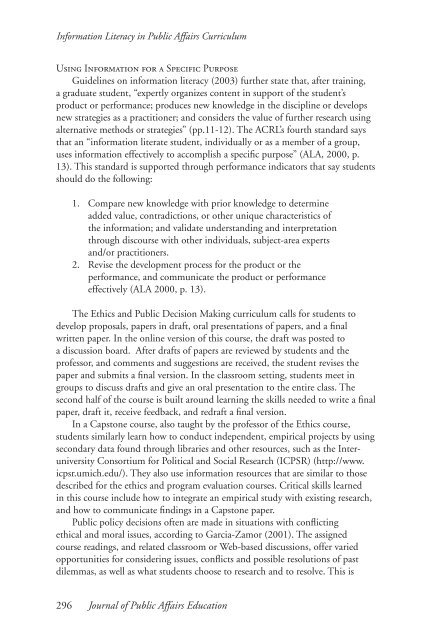JOURNAL OF PUBLIC AFFAIRS EDUCATION - Naspaa
JOURNAL OF PUBLIC AFFAIRS EDUCATION - Naspaa
JOURNAL OF PUBLIC AFFAIRS EDUCATION - Naspaa
You also want an ePaper? Increase the reach of your titles
YUMPU automatically turns print PDFs into web optimized ePapers that Google loves.
Information Literacy in Public Affairs CurriculumUsing Information for a Specific PurposeGuidelines on information literacy (2003) further state that, after training,a graduate student, “expertly organizes content in support of the student’sproduct or performance; produces new knowledge in the discipline or developsnew strategies as a practitioner; and considers the value of further research usingalternative methods or strategies” (pp.11-12). The ACRL’s fourth standard saysthat an “information literate student, individually or as a member of a group,uses information effectively to accomplish a specific purpose” (ALA, 2000, p.13). This standard is supported through performance indicators that say studentsshould do the following:1. Compare new knowledge with prior knowledge to determineadded value, contradictions, or other unique characteristics ofthe information; and validate understanding and interpretationthrough discourse with other individuals, subject-area expertsand/or practitioners.2. Revise the development process for the product or theperformance, and communicate the product or performanceeffectively (ALA 2000, p. 13).The Ethics and Public Decision Making curriculum calls for students todevelop proposals, papers in draft, oral presentations of papers, and a finalwritten paper. In the online version of this course, the draft was posted toa discussion board. After drafts of papers are reviewed by students and theprofessor, and comments and suggestions are received, the student revises thepaper and submits a final version. In the classroom setting, students meet ingroups to discuss drafts and give an oral presentation to the entire class. Thesecond half of the course is built around learning the skills needed to write a finalpaper, draft it, receive feedback, and redraft a final version.In a Capstone course, also taught by the professor of the Ethics course,students similarly learn how to conduct independent, empirical projects by usingsecondary data found through libraries and other resources, such as the InteruniversityConsortium for Political and Social Research (ICPSR) (http://www.icpsr.umich.edu/). They also use information resources that are similar to thosedescribed for the ethics and program evaluation courses. Critical skills learnedin this course include how to integrate an empirical study with existing research,and how to communicate findings in a Capstone paper.Public policy decisions often are made in situations with conflictingethical and moral issues, according to Garcia-Zamor (2001). The assignedcourse readings, and related classroom or Web-based discussions, offer variedopportunities for considering issues, conflicts and possible resolutions of pastdilemmas, as well as what students choose to research and to resolve. This is296 Journal of Public Affairs Education
















